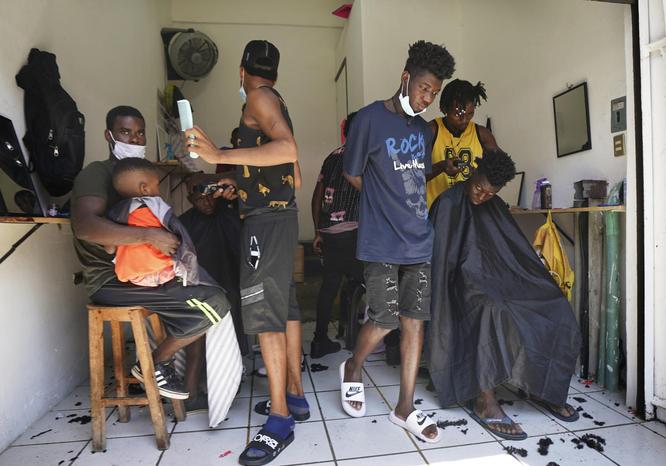Frustration of migrants roughly grows in southern Mexico
Tapachula, Mexico (AP) - Caribe Dorvil wakes up every day at 3 in the morning to prepare the food it will sell in a small street market along with dozens of Haitian compatriots in this city in southern Mexico.
Unable to get another job due to their legal situation, women and other Haitian migrants do everything they can to make a living: they sell food, without alcohol and clothing, or offer hairdressing, manicure and tailoring services under umbrella in the market.
Dorvil has requested asylum in Mexico, but the agency that processes those orders is exceeded in its capacity and lacks the resources to face the exponential increase in asylum orders in recent years.
A couple of years ago, migrants like Dorvil would have quickly passed through Tapachula, historically a stop on one of the main migration routes to the north, but lately it has become a Kafkian bureaucratic quagadder.
Faced with such a situation, hundreds of migrants left Tapachula this month to try to follow their journey to the north.The Mexican authorities arrested them, sometimes violently.According to rumors, a new caravan will try to leave this week.
The former US president Donald Trump threatened to apply tariffs to Mexico if he did not stop the flow of migrants to his border.Mexico sent troops from its national guard and more immigration agents to try to stop them in the south.

Given the daily images of clashes between Mexican authorities and migrants, many of whom travel as a family, Mexican president Andrés Manuel López Obrador has not hidden his disgust with the containment strategy and has said that it is unsustainable.
A recent morning, Dorvil prepared noodles with chicken and a small salad, which sold on the market for the two dollars.In 10 hours of work earn between five and 10 dollars.
This pays its rent - an apartment south of Tapachula that shares with nine other migrants - and barely enough food to stay alive.
"You can't work (here).There are no papers, there is nothing, one cannot do anything, ”said Dorvil."You have to sell to pay the rent, to eat.The government does not help anyone ”.
Dorvil arrived in Mexico earlier this year.As many of his countrymen lived in Chile for several years, but he left when the economy stagnated during the pandemic.
He thought he would be better in Mexico, but says he is worse.Her husband and two children remain in Chile, but they are thinking of meeting her in Mexico, which is why she has not joined any of the groups that try to leave Tapachula.
Dorvil has an appointment to manage its asylum order in mid -November.The system is overwhelmed with applications and it is not unusual for one to wait a year to start the process.
The system was already overwhelmed when the pandemic began.So far this year, more than 77.000 people have asked for asylum in Mexico, of which 55.000 are in Tapachula.Of these, 19.000 are Haitians.
Some in the Mexican government have proposed to give the Haitians - the second group of migrants after the Hondurans - the possibility of working outside the state of Chiapas, where Tapachula is located, but there is a persistent opposition.
Activist Luis Villagrán, from the center for human dignity, says there would be up to 100.000 migrants in Tapachula, almost one for every three residents of the city.
Even those who achieve some legal status find that they cannot leave Tapachula.
Another Haitian migrant, who did not mean his name for fear of reprisals, showed a humanitarian visa that gave him in Tapachula.With her he traveled to the north to the state of Tamaulipas, bordering with Texas, but there was a Mexican immigration agent, he told him that he was not valid and sent him back to Tapachula.
"I have (this visa) of a year and they returned me here, I don't know why," he said during a recent demonstration to claim that there were freedom of movement to migrants.
Enrique Vidal, coordinator of the Fray Matías Center in Córdoba for Human Rights in Tapachula, said that the containment policy and militarization of that policy have caused the collapse of the system.
"We have seen in recent days these mass mobilizations (caravans) trying to leave Tapachula," he said."They are people who have all initiated some procedure before the Mexican authorities and it is the Mexican authorities who have failed to guarantee respectful and timely and accessible access to people".










Related Articles